Black Americans see an important role for Black people in the newsgathering process as one possible way to improve coverage of race and Black communities. But they largely do not feel that their news broadly needs to come from Black journalists, nor do they see reporters’ race as a dominant factor in whether news is trustworthy.
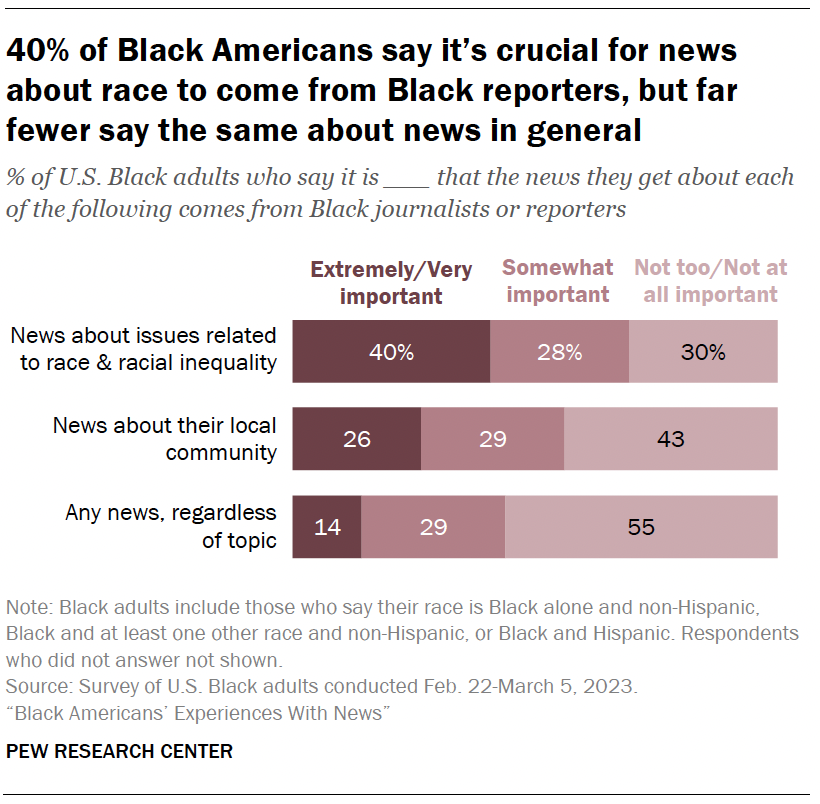
Just 14% of Black Americans, for example, say it is extremely or very important that any of the news they get, regardless of topic, comes from Black journalists or reporters. But almost three times as many (40%) say it is highly important to get coverage of issues involving race or racial inequality from Black journalists.
About a quarter of Black adults (26%) say it is highly important for news about their local community to come from Black journalists. Among those who say they live in communities where more than half of people are Black, 33% hold this view, compared with 18% among Black adults who say they live in areas where fewer than half of residents are Black.
These findings come amid ongoing discussions about diversity and inclusion in newsrooms. Journalists in the U.S. largely think their news outlets lack racial and ethnic diversity, according to previous Center research. And while experts say that diversity in newsrooms would improve the quality of news, some Black-led newsrooms have reported difficulties with funding.
Quotes from focus groups on getting news from Black journalists:
“For the younger generation, when you have kids, when they watch TV, when they watch the news, they can actually see somebody doing a report that looks like them. Many years ago, that wasn’t the case. The fact that there are news reporters and people of that nature on the screen, different stories from their point of view, I think it means a lot. … It says pride, it says self-esteem, and it says, ‘If this person can do it, I can do it too.’ Again, with all these images in the media of African Americans that’s not always with a positive light, when you have a reporter that’s just doing it the right way, going through these stories, and doing all their research, it really sends them a sense of pride. Me, even as an adult, it sends me pride as well.” –Black man, 44
“I feel like I get a more complete picture than just a White cisgender, heterosexual view. That doesn’t resonate with me, so I tend to seek out people who live a shared experience with me, especially working in the sexuality space. No one knows Black sexuality like Black people. No one knows the things that we face about the nuances that come with that, so being that, that is where my knowledge base is, that’s what I seek out.” –Black woman, 33
Black journalists compared with other journalists
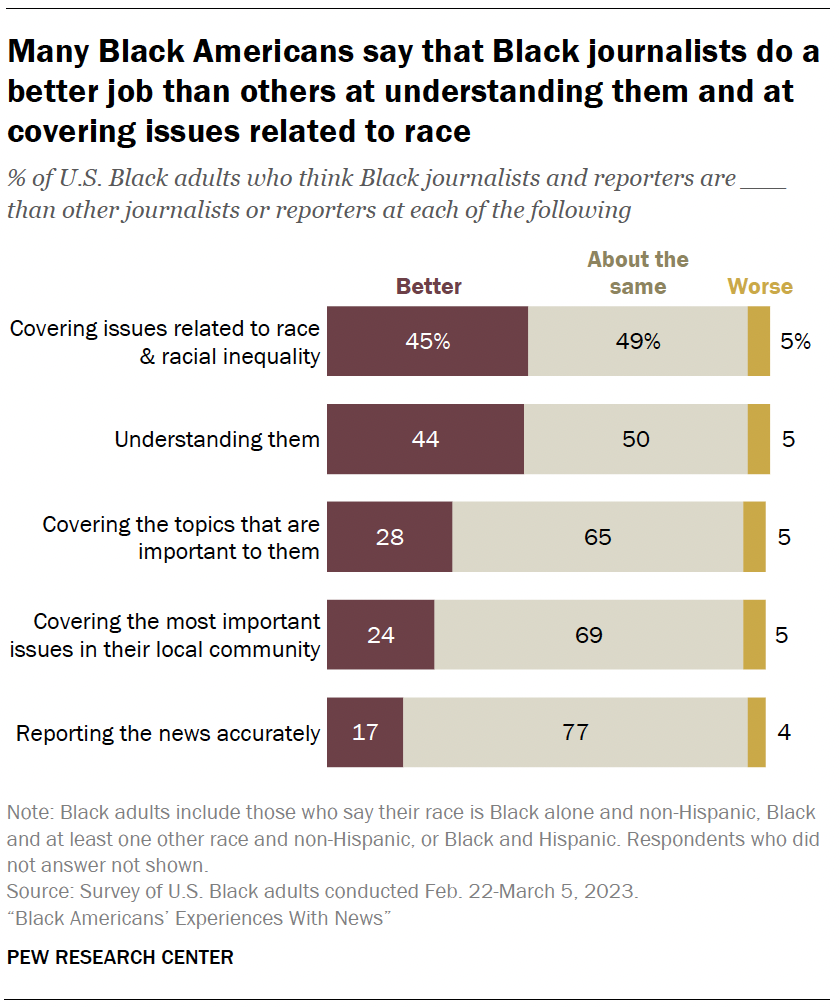
Black Americans were asked to compare Black journalists with other journalists in five different areas. The results reinforce the idea that Black Americans value representation especially for issues related to race, as well as in feeling understood.
Just under half (45%) say Black journalists cover issues of race and racial equality better than other journalists. Similarly, 44% say that Black journalists do a better job of understanding them. For these two areas, 49% and 50%, respectively, say that Black journalists do about the same as other journalists – and just 5% each say Black journalists do a worse job.
Previous Center research has found that most Americans do not feel understood by news outlets, including similar shares across racial and ethnic groups. But Black Americans are far more likely to think this misunderstanding is based on their race or some other demographic trait.
Fewer see Black journalists as doing a superior job in three other areas: covering topics important to them (28% say Black journalists are better), covering the most important issues in their community (24%) and reporting the news accurately (17%). Instead, large majorities say that Black journalists and other journalists perform about the same in these three aspects of their job.
Quotes from focus groups on feeling more understood by Black journalists:
“There’s definitely less empathy, I think, for people of color, for working class people from people who are not Black in my opinion, people who don’t understand our experiences, who don’t understand the challenges that we face, who don’t have sympathy for our experiences; I think they deliver the news in a way that is different than how someone who does understand our experiences would deliver the news.” –Black woman, 40
“I do see Black faces [on the news]. Not a lot. And it does matter. … Just seeing Black faces – someone I could relate to; someone that knows about the Black culture that’s not judgmental. A lot of times, I think they’re more empathetic culturally.” –Black woman, 38
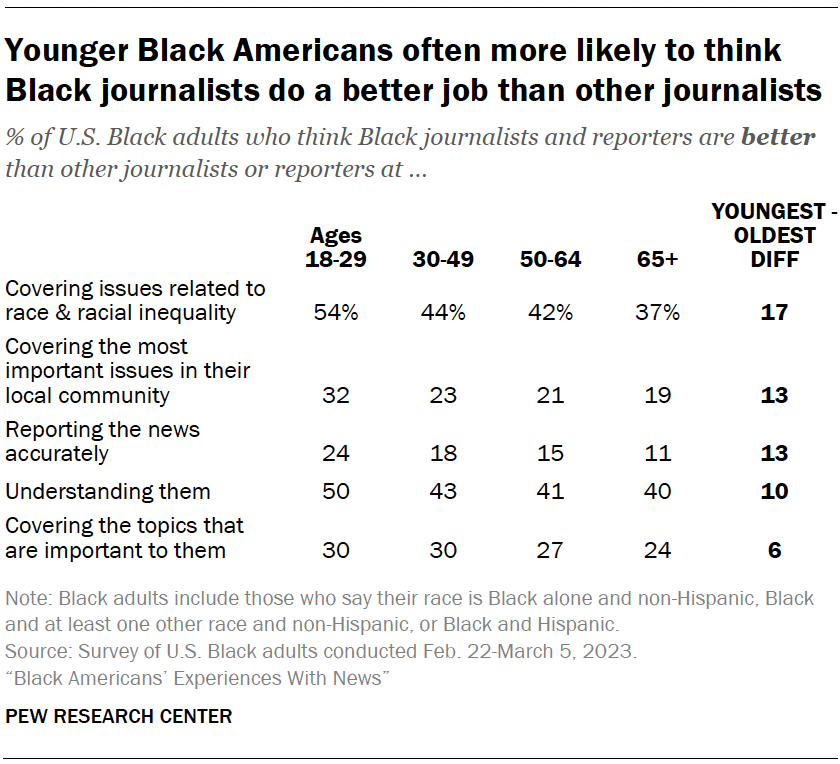
Younger Black adults see Black journalists as doing a better job than other journalists in a number of ways. For instance, 54% of Black adults ages 18 to 29 say Black journalists are better than other journalists at covering issues related to race or racial inequality, compared with 37% of those 65 and older. The youngest age group also is more likely than the oldest group to say that Black journalists are better at understanding them (50% vs. 40%).
Black Americans with higher levels of formal education and income also have more positive views toward the work of Black journalists in comparison to other journalists. While 54% of Black Americans with at least a bachelor’s degree say Black journalists are better at understanding them, that view is shared by just 35% of Black Americans who have a high school diploma or less education. A nearly identical pattern exists on whether Black journalists do better at covering issues about race (56% vs. 36%).
And Black Democrats (including those who lean Democratic) tend to be somewhat more positive than Black Republicans and GOP leaners in views of getting news from Black journalists. For instance, while 46% of Black Democrats say Black journalists understand them better than other journalists, a smaller share of Black Republicans agree (34%). A similar gap exists around covering news about issues related to race and racial inequality.
How to decide whether news is trustworthy
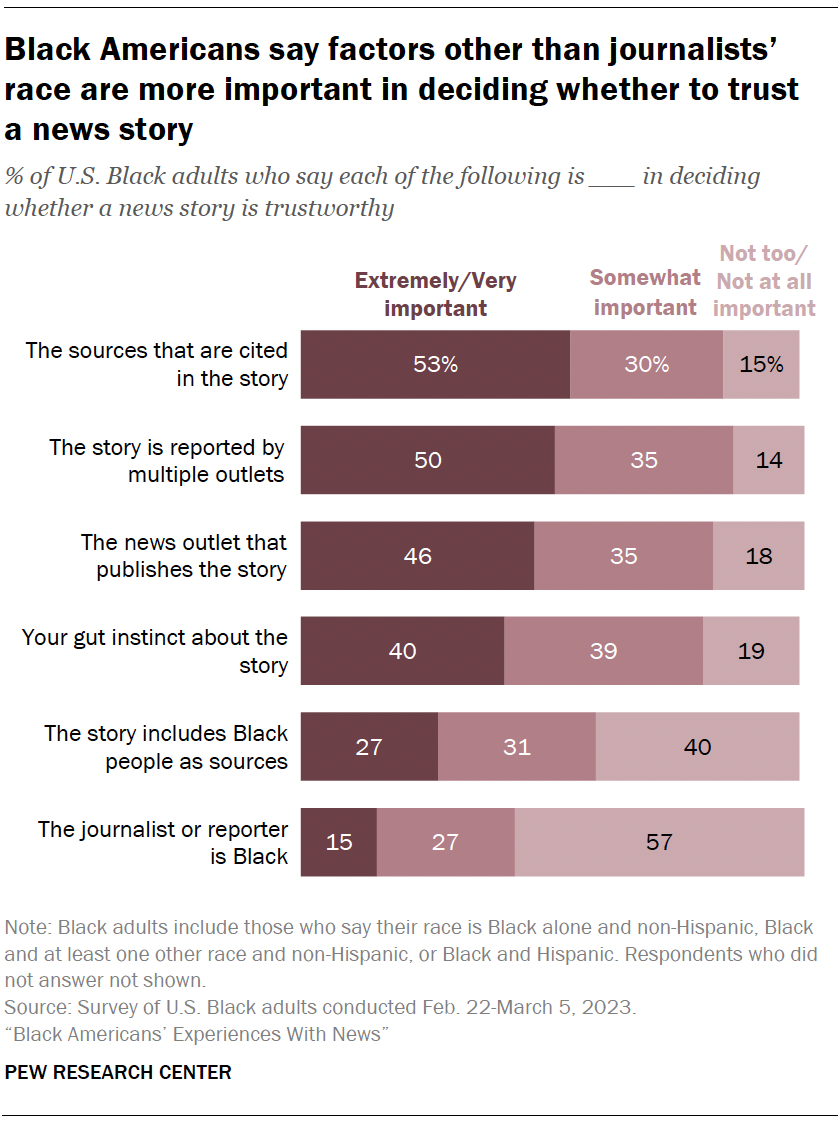
Relatively few Black Americans say a journalist or reporter being Black is a dominant factor when they decide whether a story should be trusted. Just 15% of Black adults say this is extremely or very important in deciding if a news story is trustworthy, while another 27% say it is somewhat important. Black adults are somewhat more likely to say that including Black people as sources is important in deciding whether a story is trustworthy (27% say extremely or very important; 31% somewhat important).
But Black Americans place much more weight on a variety of factors unrelated to race when deciding to trust a news story, including which sources are cited in the story, whether a story is reported by multiple outlets, the specific news outlet that publishes the story and their own gut instinct.
At least four-in-ten say each factor is extremely or very important in determining whether to trust a news story, and roughly eight-in-ten say each of these factors is at least somewhat important.
Quotes from focus groups on what makes news trustworthy:
“I piecemeal stuff together and just try to figure out what works best for me. … I can kind of get a complete story from different places be it [news outlet 1], be it [news outlet 2], be it wherever I’m going, articles friends of mine have sent me.” –Black man, 54
“Well, I mean usually everyone is talking about the same thing. You’ll automatically be like OK, so this happened and then you kind of go and look into it or whatever on Google or whatever, and then it shows up so you’re just like, OK it did happen. So usually everybody’s talking about the same thing.” –Black woman, 20
“I think you would have to get to know from your viewership. I think you have to get to know, get familiar with the anchors. For me, it’s that gut instinct, what I feel that’s right that I’ve heard from listening because that’s all you have to go on.” –Black woman, 55
Personal characteristics of journalists
Not only do few Black Americans put much weight solely on the race of a reporter when deciding if a story is trustworthy, but relatively few place much importance on other personal characteristics of journalists.
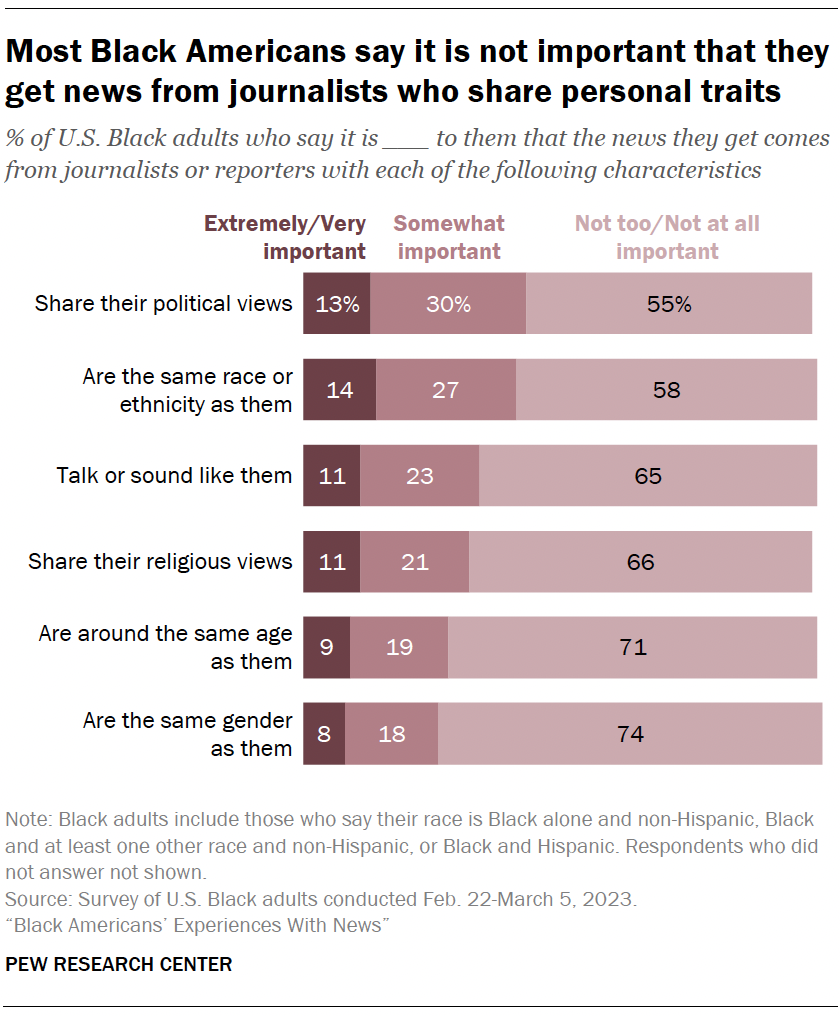
The survey asked whether it is important that journalists share six different personal characteristics with the respondent: race or ethnicity, gender, age, political views, religious views, and whether the journalist talks or sounds like them.
No more than 14% say it is extremely or very important that the news they get comes from journalists who have any of these traits, although about four-in-ten say it is at least somewhat important that journalists share their political views (43%) or their race or ethnicity (41%).
Still, majorities of Black Americans say it is not particularly important that the news they get comes from journalists with each of these personal characteristics.


